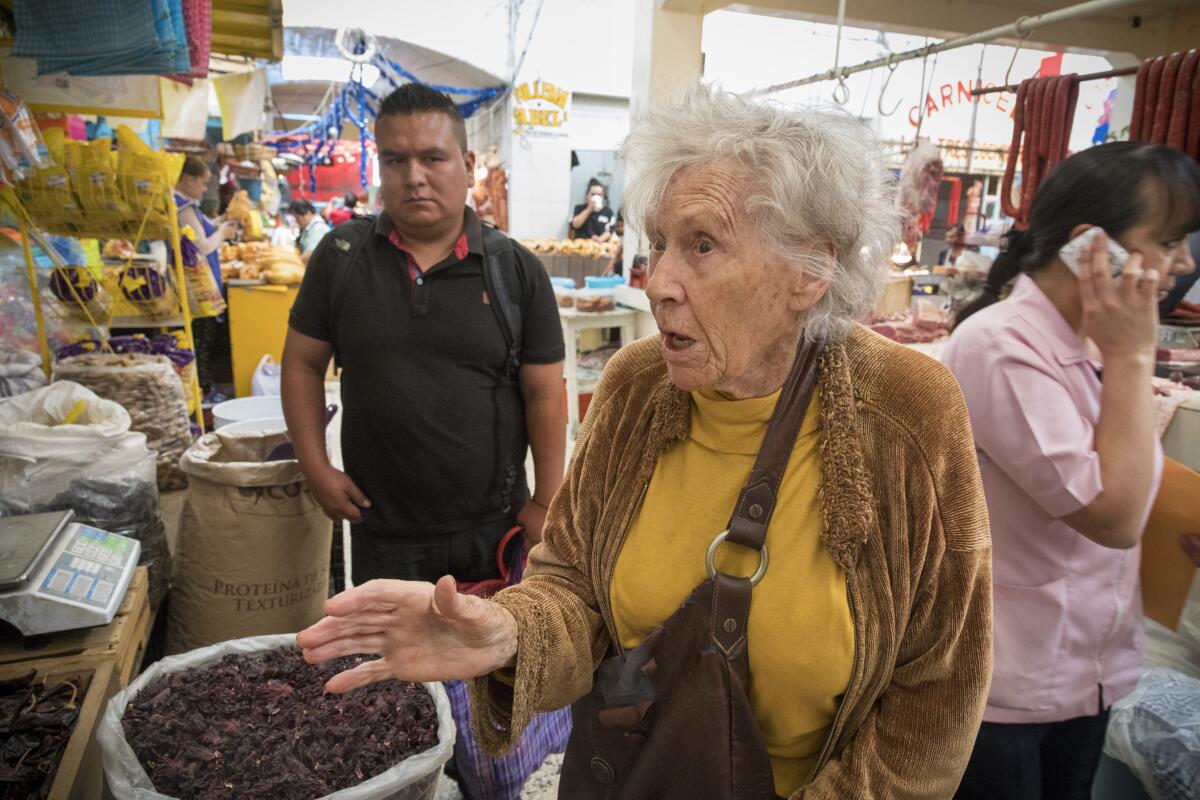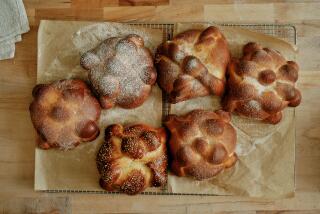Column: Choco Taco isn’t ‘authentic,’ but this Mexican respects it. Sorry, Diana Kennedy

- Share via
The recent passing of two Mexican food legends sparked grief across the world.
Online essays and testimonials were quickly published. In television and radio interviews, acolytes hailed their pioneering work in promoting Mexican food in the United States and beyond. Pundits wondered whether there would ever be another quite like them. There was a mad rush to stockpile their products, for posterity’s sake.
Am I talking about Diana Kennedy, who died Sunday at age 99 and whose cookbooks are credited with popularizing regional Mexican food in the United States? Sure. I’m also talking about the Choco Taco, the frozen treat that parent company Klondike announced on Monday would be discontinued after 39 years.
All this week, my social media timelines have hosted nonstop tributes to the two. What amuses me is who’s saying what. The praise for Kennedy is coming mostly from food writers, chefs and people who don’t blink at dropping hundreds of dollars on dinner.
The love for Choco Tacos? Everyone else.
And the Venn diagram of the two groups barely overlaps, if at all.
It’s cosmic justice — or at least further proof that God has a wicked sense of humor — that the deaths of Kennedy and the Choco Taco came just a day apart. They represent opposite ends of a battle that has raged for decades: what’s “authentic” and what’s not, and who gets to decide.
Proudly in the authenticista corner was Kennedy. She was a British-born woman who lived in Mexico during the 1960s and was shocked that the country’s upper classes largely dismissed its cuisine as peasant food. She went on to publicize Mexican food in the United States — first through classes in New York, then in a series of best-selling books.
Her career was legitimately legendary. What else would you call someone who, well into her 80s, drove a beat-up pickup truck thousands of miles across all sorts of terrain in Mexico, on the hunt for ingredients, recipes and the people who’d give them to her?

The Mexican government rewarded Kennedy with the Order of the Aztec Eagle, the highest honor bestowed on foreigners. But she couldn’t just stick to praising what she found. She never missed a chance to trash how the cuisine had developed in the United States, starting with her first book, 1972’s “The Cuisines of Mexico.”
“Far too many people know Mexican food as a ‘mixed plate,’” she wrote, her sneer vaulting off the page. Kennedy went on to list the supposed sins of this meal: a hard-shelled taco, refried beans, a “soggy tamal” smothered in a “too sweet and too overpoweringly onioned” sauce and “something else that looks and tastes like all the rest.”
“Where is the wonderful play,” she concluded, “of texture, color and flavor that makes up an authentic, well-cooked Mexican meal?”
Never mind that what she described sounds divine. I like my jumble of cheesy items with extra rice — and hold the salad that no one touches.
With her dismissive words, Kennedy mocked generations of Mexicans in the American Southwest who had developed their own unique food traditions, like the taco trucks of Los Angeles, Denver’s wonton-wrapped chile rellenos or the chile con carne of Tex-Mex.
“If you haven’t got an opinion,” Diana Kennedy says, “you aren’t a very good cook anyway.”
I never had a problem with Kennedy — a white woman — telling the world about the glories of Mexican food. I had a problem with her lambasting people like me. Kennedy had bought into the lies of Mexican elites, who then and now laughed off Mexican Americans as pochos — not the real thing.
Reading “The Cuisines of Mexico” today, it’s painfully obvious that Kennedy never bothered to visit the home kitchens of Mexican immigrants in Southern California, where she would’ve found more than a few of the recipes — albóndigas, pipian, pozole, buñuelos and calabacitas, to name the most obvious — that she claimed didn’t properly exist in el Norte.
Tellingly, Kennedy’s first book named only one place in Los Angeles — El Mercadito in Boyle Heights — where her readers might source Mexican ingredients, while listing 11 in Manhattan.
Her treatment of Mexican food as a museum piece was paternalistic at best and racist at worst. But that was classic Kennedy, whom the food media loved to portray as a foul-mouthed mix of Indiana Jones and Miss Marple. Maybe they and their readers needed someone to teach them how special and varied Mexican food was.
But my parents’ generation — who, to this day, come back from the motherland lugging suitcases stuffed with local cheeses, edible seeds, chiles and candies — never needed any pinche lessons.
Kennedy has her place in the history of Mexican food in the U.S., but future generations won’t remember her kindly, just like they don’t remember Bertha Haffner-Ginger, Erna Fergusson and other gabachas who made a career out of hawking “authentic” Mexican recipes to Americans decades before.
The same can’t be said for the Choco Taco.
Few other foods can seem so non-Mexican as this: an ice cream confection concocted by a white guy from Philadelphia. And yet it’s muy, muy Mexican. Its core ingredients — chocolate, vanilla and a taco shell (albeit one made of waffle cone) — are Mexican in origin. Its affordability and ubiquity make it a treat for the masses, unlike the “authentic” meals at American Express prices made by high-end chefs like Rick Bayless who followed Kennedy’s gospel.
I’m actually not the biggest fan of Choco Tacos as a dessert — the shell is too rubbery, the chocolate and vanilla flavors not pronounced enough, the peanuts an afterthought. I prefer sherbet-flavored Push-Up pops or Popsicles in the form of animated characters like SpongeBob SquarePants or the Pink Panther.
When New York chef Alex Stupak came to town recently to promote his new book, “Tacos: Recipes and Provocations,” Roy Choi threw a book-signing party and dinner at Pot.
But Choco Tacos represent happiness, summertime and family. That combo plate to me was always Mexican, because that was the scene whenever I bought some from the neighborhood ice cream truck or paletero, whether I was a kid or an adult.
The Choco Taco functions better as a metaphor, anyway. Tradition is important — but so is making and embracing our own traditions, letting other cultures learn from us and vice versa. Evolution, not stasis, is why Mexican food remains one of the most vibrant cuisines in the world. Nothing’s more authentically Mexican than a mishmash — and if you don’t believe that, you must think that Bohemia beer is named after an Aztec emperor.
The hubbub over Kennedy and Choco Taco inspired me to seek out both. I dug up my Kennedy books and quickly put them away — why read about recipes I could go enjoy down the street? Then, I went on a search for Choco Tacos.
First, my local Northgate Gonzalez and Superior Grocers markets — sold out, while rows of Mexican iced treats like ice cream, paletas and bolis (freezies) sat untouched. American supermarkets — same. Liquor store after liquor store — nothing.
Finally, I found Choco Tacos at a gas station deep in Santa Ana and bought six. I asked the cashier if people had been buying them up. “Yeah, they always sell good,” he replied.
The poor guy obviously hadn’t heard the news, so I told him. His eyes widened.
“Damn, that sucks!” he said, then stopped and smiled. “I better get a bunch!”
More to Read
Sign up for Essential California
The most important California stories and recommendations in your inbox every morning.
You may occasionally receive promotional content from the Los Angeles Times.











